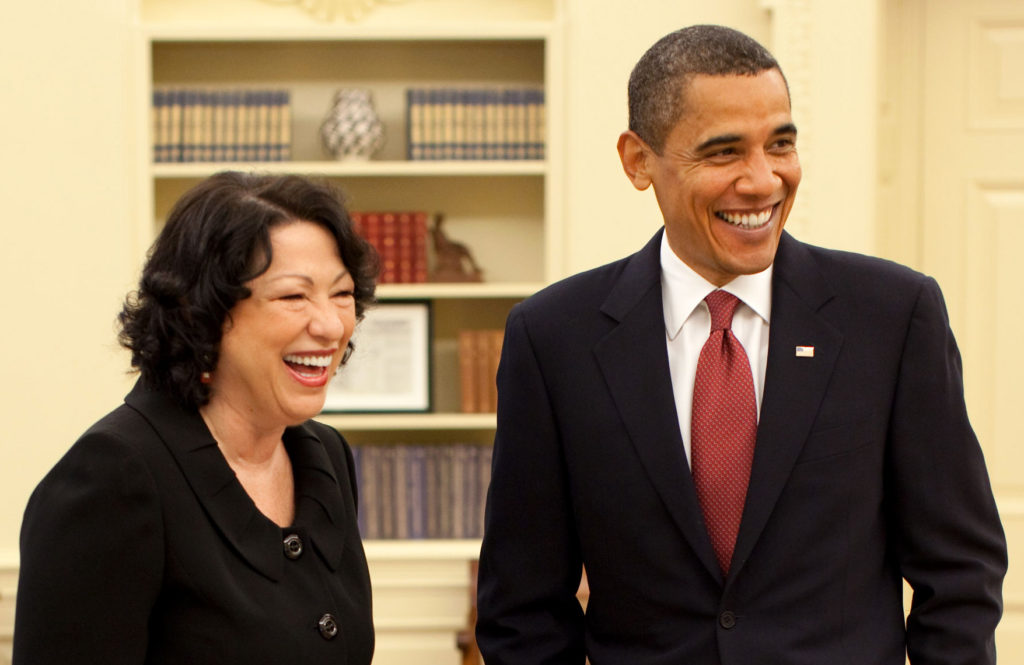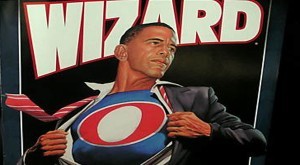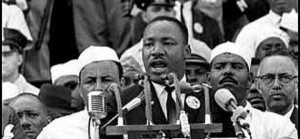For Immediate Release
May 26, 2009
REMARKS BY THE PRESIDENT
IN NOMINATING JUDGE SONIA SOTOMAYOR TO THE UNITED STATES SUPREME COURT
10:13 A.M. EDT
THE PRESIDENT: Thank you. Well, I’m excited, too. (Laughter.)
Of the many responsibilities granted to a President by our Constitution, few are more serious or more consequential than selecting a Supreme Court justice. The members of our highest court are granted life tenure, often serving long after the Presidents who appointed them. And they are charged with the vital task of applying principles put to paper more than 20 [sic] centuries ago to some of the most difficult questions of our time.
So I don’t take this decision lightly. I’ve made it only after deep reflection and careful deliberation. While there are many qualities that I admire in judges across the spectrum of judicial philosophy, and that I seek in my own nominee, there are few that stand out that I just want to mention.
First and foremost is a rigorous intellect — a mastery of the law, an ability to hone in on the key issues and provide clear answers to complex legal questions. Second is a recognition of the limits of the judicial role, an understanding that a judge’s job is to interpret, not make, law; to approach decisions without any particular ideology or agenda, but rather a commitment to impartial justice; a respect for precedent and a determination to faithfully apply the law to the facts at hand.
These two qualities are essential, I believe, for anyone who would sit on our nation’s highest court. And yet, these qualities alone are insufficient. We need something more. For as Supreme Court Justice Oliver Wendell Holmes once said, “The life of the law has not been logic; it has been experience.” Experience being tested by obstacles and barriers, by hardship and misfortune; experience insisting, persisting, and ultimately overcoming those barriers. It is experience that can give a person a common touch and a sense of compassion; an understanding of how the world works and how ordinary people live. And that is why it is a necessary ingredient in the kind of justice we need on the Supreme Court.
The process of reviewing and selecting a successor to Justice Souter has been rigorous and comprehensive, not least because of the standard that Justice Souter himself has set with his formidable intellect and fair-mindedness and decency. I’ve sought the advice of members of Congress on both sides of the aisle, including every member of the Senate Judiciary Committee. My team has reached out to constitutional scholars, advocacy organizations, and bar associations representing an array of interests and opinions. And I want to thank members of my staff and administration who’ve worked so hard and given so much of their time as part of this effort.
After completing this exhaustive process, I have decided to nominate an inspiring woman who I believe will make a great justice: Judge Sonia Sotomayor of the great state of New York. (Applause.)
Over a distinguished career that spans three decades, Judge Sotomayor has worked at almost every level of our judicial system, providing her with a depth of experience and a breadth of perspective that will be invaluable as a Supreme Court justice.
It’s a measure of her qualities and her qualifications that Judge Sotomayor was nominated to the U.S. District Court by a Republican President, George H.W. Bush, and promoted to the Federal Court of Appeals by a Democrat, Bill Clinton. Walking in the door she would bring more experience on the bench, and more varied experience on the bench, than anyone currently serving on the United States Supreme Court had when they were appointed. Judge Sotomayor is a distinguished graduate of two of America’s leading universities. She’s been a big-city prosecutor and a corporate litigator. She spent six years as a trial judge on the U.S. District Court, and would replace Justice Souter as the only justice with experience as a trial judge, a perspective that would enrich the judgments of the Court.
For the past 11 years she has been a judge on the Court of Appeals for the Second Circuit of New York, one of the most demanding circuits in the country. There she has handed down decisions on a range of constitutional and legal questions that are notable for their careful reasoning, earning the respect of colleagues on the bench, the admiration of many lawyers who argue cases in her court, and the adoration of her clerks who look to her as a mentor.
During her tenure on the District Court, she presided over roughly 450 cases. One case in particular involved a matter of enormous concern to many Americans, including me: the baseball strike of 1994-1995. (Laughter.) In a decision that reportedly took her just 15 minutes to announce, a swiftness much appreciated by baseball fans everywhere — (laughter) — she issued an injunction that helped end the strike. Some say that Judge Sotomayor saved baseball. (Applause.)
Judge Sotomayor came to the District Court from a law firm where she was a partner focused on complex commercial litigation, gaining insight into the workings of a global economy. Before that she was a prosecutor in the Manhattan DA’s office, serving under the legendary Robert Morgenthau, an early mentor of Sonia’s who still sings her praises today. There, Sonia learned what crime can do to a family and a community, and what it takes to fight it. It’s a career that has given her not only a sweeping overview of the American judicial system, but a practical understanding of how the law works in the everyday lives of the American people.
But as impressive and meaningful as Judge Sotomayor’s sterling credentials in the law is her own extraordinary journey. Born in the South Bronx, she was raised in a housing project not far from Yankee Stadium, making her a lifelong Yankee’s fan. I hope this will not disqualify her — (laughter) — in the eyes of the New Englanders in the Senate. (Laughter.)
Sonia’s parents came to New York from Puerto Rico during the second world war, her mother as part of the Women’s Army Corps. And, in fact, her mother is here today and I’d like us all to acknowledge Sonia’s mom. (Applause.) Sonia’s mom has been a little choked up. (Laughter.) But she, Sonia’s mother, began a family tradition of giving back to this country. Sonia’s father was a factory worker with a 3rd-grade education who didn’t speak English. But like Sonia’s mother, he had a willingness to work hard, a strong sense of family, and a belief in the American Dream.
When Sonia was nine, her father passed away. And her mother worked six days a week as a nurse to provide for Sonia and her brother — who is also here today, is a doctor and a terrific success in his own right. But Sonia’s mom bought the only set of encyclopedias in the neighborhood, sent her children to a Catholic school called Cardinal Spellman out of the belief that with a good education here in America all things are possible.
With the support of family, friends, and teachers, Sonia earned scholarships to Princeton, where she graduated at the top of her class, and Yale Law School, where she was an editor of the Yale Law Journal, stepping onto the path that led her here today.
Along the way she’s faced down barriers, overcome the odds, lived out the American Dream that brought her parents here so long ago. And even as she has accomplished so much in her life, she has never forgotten where she began, never lost touch with the community that supported her.
What Sonia will bring to the Court, then, is not only the knowledge and experience acquired over a course of a brilliant legal career, but the wisdom accumulated from an inspiring life’s journey.
It’s my understanding that Judge Sotomayor’s interest in the law was sparked as a young girl by reading the Nancy Drew series — (laughter) — and that when she was diagnosed with diabetes at the age of eight, she was informed that people with diabetes can’t grow up to be police officers or private investigators like Nancy Drew. And that’s when she was told she’d have to scale back her dreams.
Well, Sonia, what you’ve shown in your life is that it doesn’t matter where you come from, what you look like, or what challenges life throws your way — no dream is beyond reach in the United States of America.
And when Sonia Sotomayor ascends those marble steps to assume her seat on the highest court of the land, America will have taken another important step towards realizing the ideal that is etched above its entrance: Equal justice under the law.
I hope the Senate acts in a bipartisan fashion, as it has in confirming Judge Sotomayor twice before, and as swiftly as possible so that she can take her seat on the Court in September and participate in deliberations as the Court chooses which cases it will hear this coming year.
And with that, I’d like all of you to give a warm greeting as I invite Judge Sotomayor to say a few words. (Applause.)
JUDGE SOTOMAYOR: I was just counseled not to be nervous. (Laughter.) That’s almost impossible. (Laughter.)
Thank you, Mr. President, for the most humbling honor of my life. You have nominated me to serve on the country’s highest court, and I am deeply moved.
I could not, in the few minutes I have today, mention the names of the many friends and family who have guided and supported me throughout my life and who have been instrumental in helping me realize my dreams. I see many of those faces in this room. Each of you, whom I love deeply, will know that my heart today is bursting with gratitude for all you have done for me.
The President has said to you that I bring my family. In the audience is my brother, Juan Sotomayor — he’s a physician in Syracuse, New York; my sister-in-law, Tracey; my niece, Kylie — she looks like me — (laughter) — my twin nephews, Conner and Corey. I stand on the shoulders of countless people, yet there is one extraordinary person who is my life aspiration — that person is my mother, Celina Sotomayor. (Applause.)
My mother has devoted her life to my brother and me, and as the President mentioned, she worked often two jobs to help support us after Dad died. I have often said that I am all I am because of her, and I am only half the woman she is.
Sitting next to her is Omar Lopez, my mom’s husband and a man whom I have grown to adore. I thank you for all that you have given me and continue to give me. I love you. (Applause.)
I chose to be a lawyer, and ultimately a judge, because I find endless challenge in the complexities of the law. I firmly believe in the rule of law as the foundation for all of our basic rights. For as long as I can remember, I have been inspired by the achievement of our Founding Fathers. They set forth principles that have endured for more than two centuries. Those principles are as meaningful and relevant in each generation as the generation before. It would be a profound privilege for me to play a role in applying those principles to the questions and controversies we face today.
Although I grew up in very modest and challenging circumstances, I consider my life to be immeasurably rich. I was raised in a Bronx public housing project, but studied at two of the nation’s finest universities. I did work as an assistant district attorney, prosecuting violent crimes that devastate our communities. But then I joined a private law firm and worked with international corporations doing business in the United States. I have had the privilege of serving as a Federal District Court trial judge, and am now serving as a Federal Appellate Circuit Court judge.
This wealth of experiences, personal and professional, have helped me appreciate the variety of perspectives that present themselves in every case that I hear. It has helped me to understand, respect, and respond to the concerns and arguments of all litigants who appear before me, as well as to the views of my colleagues on the bench. I strive never to forget the real-world consequences of my decisions on individuals, businesses, and government.
It is a daunting feeling to be here. Eleven years ago, during my confirmation process for appointment to the Second Circuit, I was given a private tour of the White House. It was an overwhelming experience for a kid from the South Bronx. Yet never in my wildest childhood imaginings did I ever envision that moment, let alone did I ever dream that I would live this moment.
Mr. President, I greatly appreciate the honor you are giving me, and I look forward to working with the Senate in the confirmation process. I hope that as the Senate and the American people learn more about me they will see that I am an ordinary person who has been blessed with extraordinary opportunities and experiences. Today is one of those experiences.
Thank you again, sir. (Applause.)
——
For Immediate Release
August 6, 2009
REMARKS BY THE PRESIDENT
ON THE CONFIRMATION OF JUDGE SONIA SOTOMAYOR
Diplomatic Reception Room
3:38 P.M. EDT
THE PRESIDENT: Hello, everybody. Well, I am pleased and deeply gratified that the Senate has voted to confirm Judge Sonia Sotomayor as our nation’s 111th Supreme Court justice.
I want to thank the Senate Judiciary Committee, particularly its Chairman, Senator Leahy — as well as its Ranking Member, Senator Sessions — for giving Judge Sotomayor a thorough and civil hearing. And I thank them for doing so in a timely manner so that she can be fully prepared to take her seat when the Court’s work begins this September.
The members of our Supreme Court are granted life tenure and are charged with the vital and difficult task of applying principles set forth at our founding to the questions and controversies of our time. Over the past 10 weeks, members of the Senate Judiciary Committee and the full Senate have assessed Judge Sotomayor’s fitness for this work. They’ve scrutinized her record as a prosecutor, as a litigator, and as a judge. They’ve gauged her respect for the proper role of each branch of our government, her commitment to faithfully apply the law to the facts at hand, and her determination to protect our core constitutional rights and freedoms.
And with this historic vote, the Senate has affirmed that Judge Sotomayor has the intellect, the temperament, the history, the integrity and the independence of mind to ably serve on our nation’s highest court.
This is a role that the Senate has played for more than two centuries, helping to ensure that “equal justice under the law” is not merely a phrase inscribed above our courthouse door, but a description of what happens every single day inside the courtroom. It’s a promise that, whether you’re a mighty corporation or an ordinary American, you will receive a full and fair hearing. And in the end, the outcome of your case will be determined by nothing more or less than the strength of your argument and the dictates of the law.
These core American ideals — justice, equality, and opportunity — are the very ideals that have made Judge Sotomayor’s own uniquely American journey possible. They’re ideals she’s fought for throughout her career, and the ideals the Senate has upheld today in breaking yet another barrier and moving us yet another step closer to a more perfect union.
Like so many other aspects of this nation, I’m filled with pride in this achievement and great confidence that Judge Sotomayor will make an outstanding Supreme Court justice. This is a wonderful day for Judge Sotomayor and her family, but I also think it’s a wonderful day for America.
Thank you very much, everybody.
Q Are you happy with the 68 votes, sir?
THE PRESIDENT: I’m very happy.
———
For Immediate Release
August 12, 2009
REMARKS BY THE PRESIDENT
AND SUPREME COURT JUSTICE SONIA SOTOMAYOR AT RECEPTION IN HER HONOR
EAST ROOM
10:17 A.M. EDT
THE PRESIDENT: Good morning, everybody, and welcome to the White House. I am glad all of you could be with us today as we honor the newest member of our highest Court who I’m proud to address, for the very first time, as Justice Sonia Sotomayor. (Applause.)
We are also honored to be joined by Justice Sotomayor’s new colleagues. We have Justice Ginsburg who is here — (applause) — as well as Justice Stevens. So I just want to thank both Justice Stevens and Justice Ginsburg not only for being here today, but for your extraordinary service on the Court. And I know you’ll be giving Justice Sotomayor some good tips. (Laughter.)
I also want to thank everyone who’s worked so hard to bring us to this day. I want to thank especially our Judiciary Committee Chairman, Senator Patrick Leahy — (applause) — as well as our Senate Majority Leader, Senator Reid — (applause) — for their outstanding work to complete this process before the August recess.
I want to thank Senator Schumer and Senator Gillibrand, both of whom are Justice Sotomayor’s home-state senators, for their extraordinary work on her behalf. I want to thank all the members of Congress who’ve taken the time to join us here at the White House event. And I want to acknowledge all the advocates and groups who organized and mobilized and supported these efforts from the very beginning. Your work was absolutely critical to our success, and I appreciate all that you’ve done. So pat yourselves on the back. Congratulations. (Applause.)
Two members of Congress that I just especially want to acknowledge — Senator Bob Menendez, who worked so hard on the Senate side. (Applause.) And Congresswoman Nydia Velazquez, who is our chair of the Congressional Hispanic Caucus. (Applause.)
And I think we all want to take a moment to recognize the woman who, in so many ways, truly made this day possible — Justice Sotomayor’s mother, Celina Sotomayor. (Applause.) Mrs. Sotomayor is here with her husband, Omar; and Justice Sotomayor’s brother, Juan; and other members of their family. And we’re thrilled that they could join us here today.
And by the way — I don’t normally do this, but let me also just thank my extraordinary White House staff who helped to usher this stuff through. We’re very proud of them. (Applause.) Thank you very much.
Of course, we’re here not just to celebrate our extraordinary new Supreme Court justice and all those who’ve been a part of her journey to this day. We’re here, as well, to celebrate an extraordinary moment for our nation. We celebrate the impact Justice Sotomayor has already had on people across America who have been inspired by her exceptional life story. We celebrate the greatness of a country in which such a story is possible. And we celebrate how, with their overwhelming vote to confirm Justice Sotomayor, the United States Senate –- Republicans and Democrats — tore down yet one more barrier and affirmed our belief that in America, the doors of opportunity must be open to all.
With that vote, the Senate looked beyond the old divisions and they embraced excellence. They recognized Justice Sotomayor’s intellect, her integrity, and her independence of mind; her respect for the proper role of each branch of government; her fidelity to the law in each case that she hears; and her devotion to protecting our core constitutional rights and liberties.
Justice William Brennan once said that in order for government to ensure those rights for all its citizens, government officials must be attentive to the concrete human realities at stake in the decisions they make. They must understand, as Justice Brennan put it, “the pulse of life beneath the official version of events.” The pulse of life beneath the official version of events.
Justice Sotomayor understands those realities because she’s witnessed them firsthand as a prosecutor, a litigator, and a judge, working to uphold our laws, keep our communities safe, and give people the chance to live out their dreams — work that she has done with devotion, with distinction, and with an unyielding commitment to give back to this country that has given her so much.
And she understands these things because she’s lived these things — because her life is one of those “only in America” stories: raised by a single mom in the South Bronx determined to give her every opportunity to succeed; propelled by the talent and hard work that would earn her scholarships and honors at the best schools in the country; driven always by the belief that it doesn’t matter where you come from, or what you look like, or what challenges life throws your way — no dream is beyond reach in the United States of America.
And with her extraordinary breadth and depth of experience, Justice Sotomayor brings to the Court both a mastery of the letter of the law and an understanding of how the law actually unfolds in our daily lives — its impact on how we work and worship and raise our families; on whether we have the opportunities we need to live the lives we imagine.
That understanding is vital for the work of a Supreme Court justice, as Justice Stevens and Justice Ginsburg will testify — the work of applying principles set forth at our founding to the cases and controversies of our time.
For as visionary as our founders were, they did not presume to know exactly how the times would change, what new questions fate and history would set before us. Instead, they sought to articulate ideals that would be timeless — ideals that would accommodate the ever-changing circumstances of our lives and preserve for each new generation our most sacred rights and freedoms.
When Justice Sotomayor put her hand on that Bible and took that oath, we took yet another step towards realizing those ideals. We came yet another step closer to the more perfect union that we all seek.
Because while this is Justice Sotomayor’s achievement –- the result of her ability and determination -– this moment is not just about her. It’s about every child who will grow up thinking to him or herself, if Sonia Sotomayor can make it, then maybe I can, too. (Applause.) It’s about every mother or father who looks at the sacrifices Justice Sotomayor’s mother made, and the successes she and her brother have had, and thinks, I may not have much in my own life, but if I work hard enough, maybe my kids can have more. It’s about everyone in this nation facing challenges and struggles in their lives, who hear Justice Sotomayor’s story and thinks to themselves, if she could overcome so much and go so far, then why can’t I?
Nearly 80 years ago, as the cornerstone was laid for the building that became our Supreme Court, Chief Justice Charles Evans Hughes declared, “The Republic endures and this is the symbol of its faith.”
Justice Sotomayor’s rise from humble beginnings to the height of achievement is yet another symbol of that faith — faith that the American Dream still endures; faith that “equal justice under the law” is not just an inscription in marble, but an animating ideal of our democracy; faith that in this great nation, all things are still possible for all people.
This is a great day for America, and I know that all of us here are proud and honored to have been a part of it.
And so, with that, I would like to introduce the newest member of the United States Supreme Court, Justice Sonia Sotomayor. (Applause.)
JUSTICE SOTOMAYOR: No words can adequately express what I am feeling. No speech can fully capture my joy in this moment. Nothing can convey the depth of gratitude I feel to the countless family members, starting with Mom and my brother, and the many friends and colleagues — so many of you who are here with me today, and the others who aren’t — who have helped me to reach this moment. None of this would have happened without all of you.
Mr. President, I have the most heartfelt appreciation for the trust that you’ve placed in me by nominating me. And I want to convey my thanks to the Judiciary Committee, led by Chairperson Leahy, for conducting a respectful and timely hearing, and to all members of the Senate for approving the President’s selection. I am so grateful to all of you for this extraordinary opportunity.
I am most grateful to this country. I stand here today knowing that my confirmation as an Associate Justice of the Supreme Court would never have been possible without the opportunities presented to me by this nation. More than two centuries ago, in a Constitution that contains fewer than 5,000 words, our founders set forth their vision for this new land. Their self-proclaimed task was to form a more perfect union, to establish justice, and to secure the blessings of liberty for themselves and their posterity. Over the years, the ideals at the heart of that document have endured, as subsequent generations have expanded those blessings, these rights and freedoms to more and more Americans.
Our Constitution has survived domestic and international tumult, including a civil war, two world wars, and the catastrophe of September 11th. It draws together people of all races, faiths, and backgrounds from all across this country who carry its words and values in our heart. It is this nation’s faith in a more perfect union that allows a Puerto Rican girl from the Bronx to stand here now. (Applause.)
I am struck again today by the wonder of my own life, and the life we in America are so privileged to lead. In reflecting on my life experiences, I am thinking also today of the judicial oath of office that I first took almost two decades ago, and that I reiterated this past weekend — to judge without respect to what a person looks like, where they come from, or whether they are rich or poor, and to treat all persons as equal under the law. That is what our system of justice requires, and it is the foundation of the American people’s faith in the rule of law, and it is why I am so passionate about the law.
I am deeply humbled by the sacred responsibility of upholding our laws and safeguarding the rights and freedoms set forth in our Constitution. I ask not just my family and friends, but I ask all Americans, to wish me divine guidance and wisdom in administering my new office.
I thank you all again for the love and support you have shown me. And I thank President Obama and the United States Senate for the tremendous honor and privilege they have granted me. Thank you. (Applause.)





